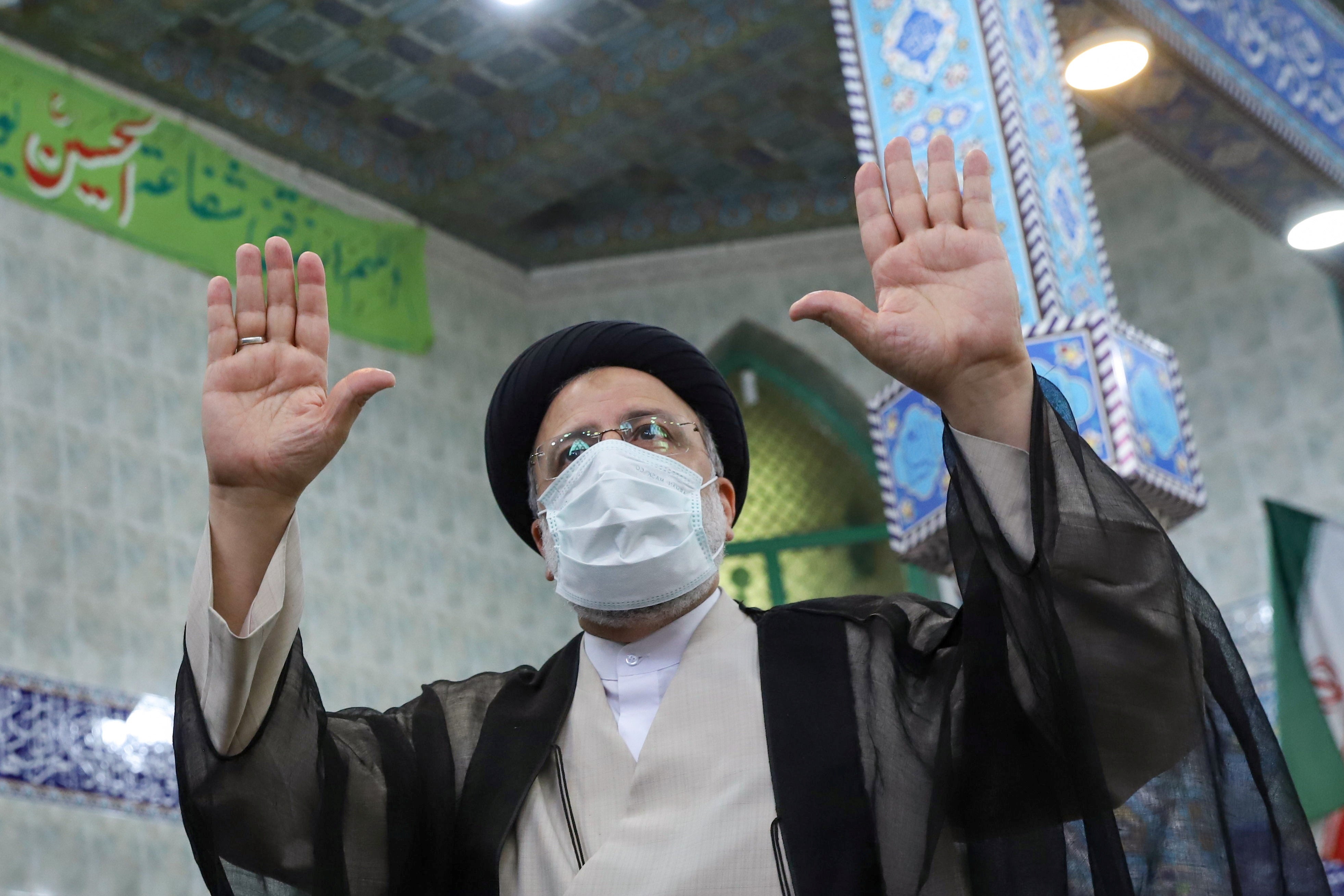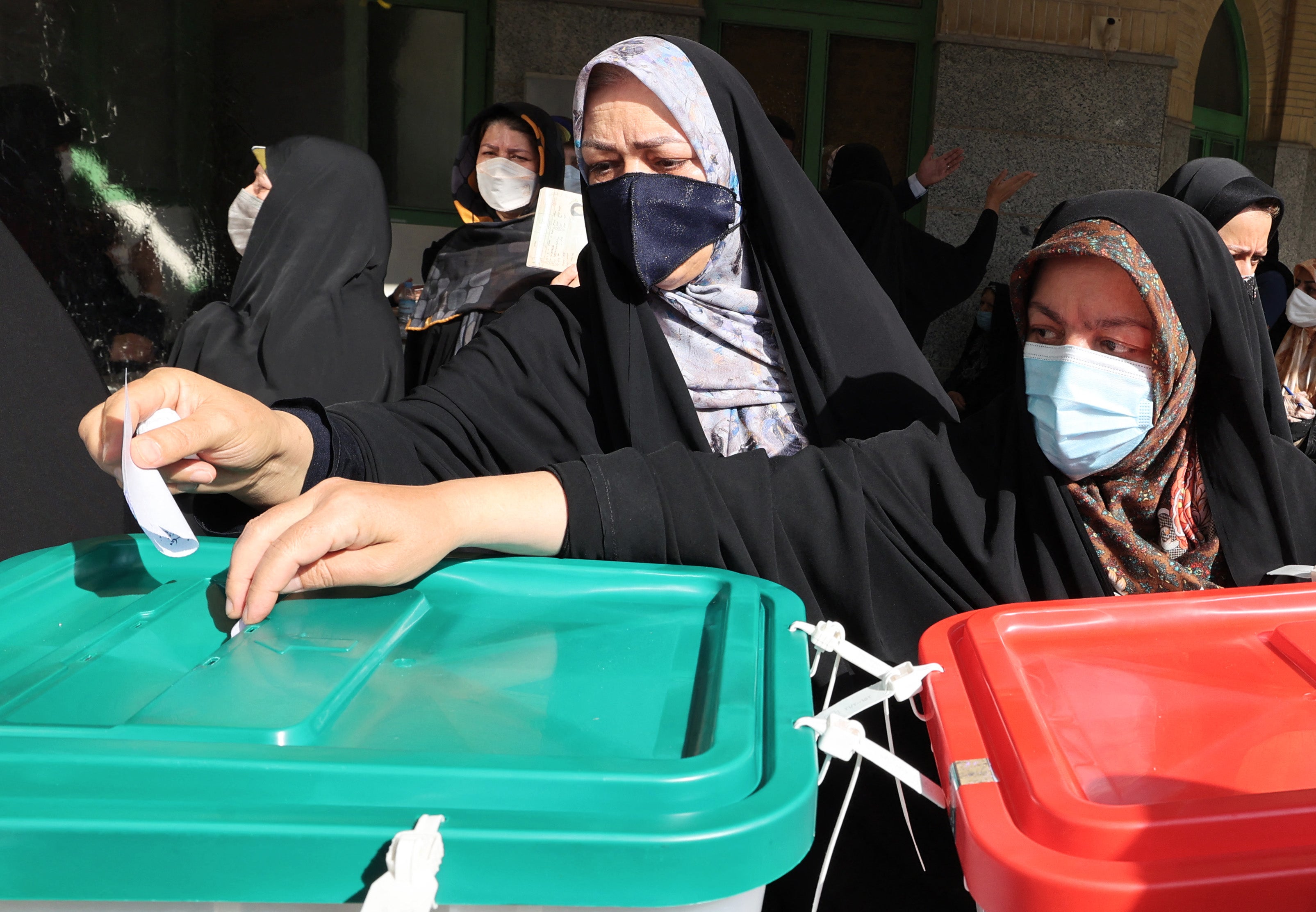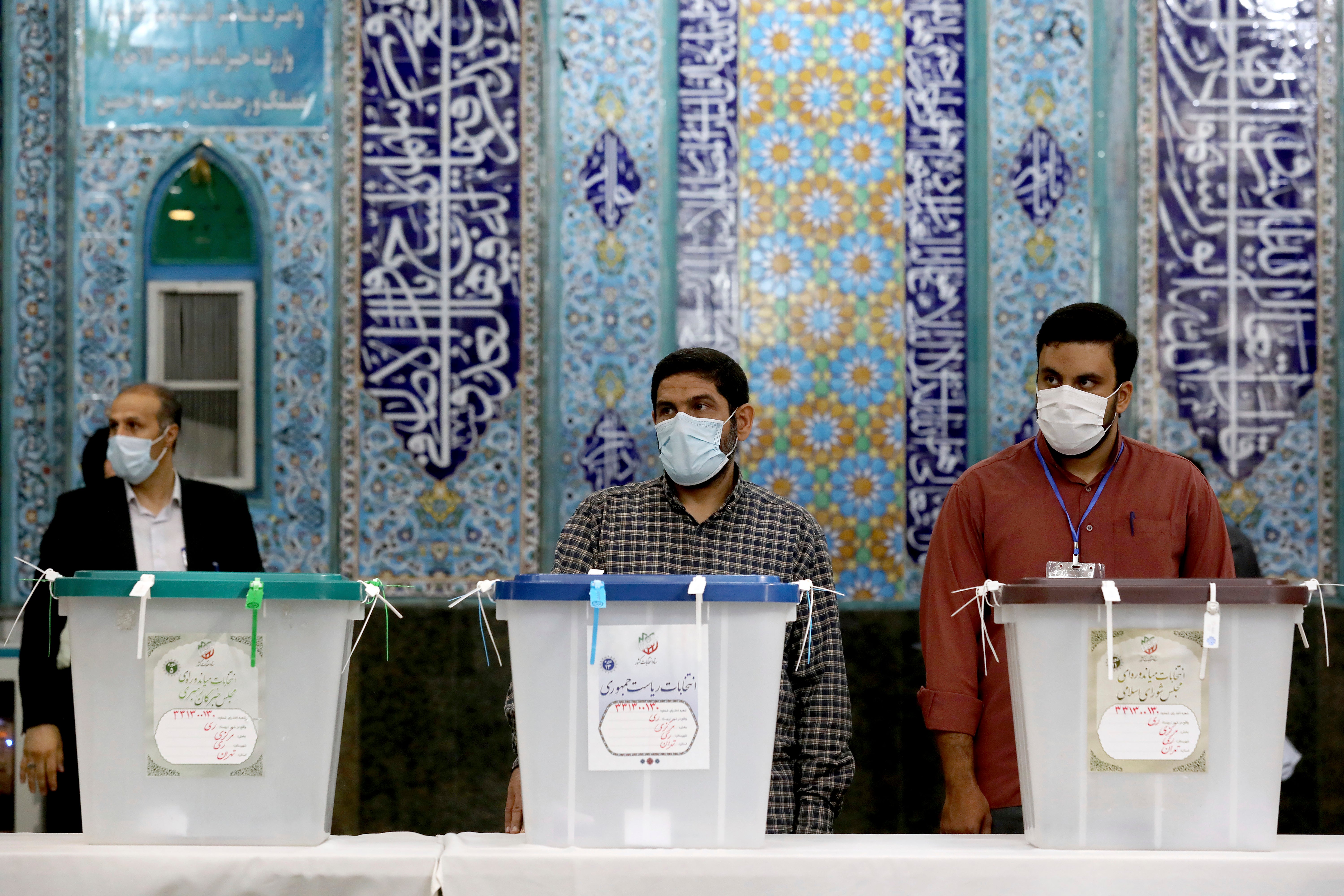Weary Iranians vote in presidential election, but fear the result is already known
Hardliner Ebrahim Raisi is the man widely predicted to win

Your support helps us to tell the story
From reproductive rights to climate change to Big Tech, The Independent is on the ground when the story is developing. Whether it's investigating the financials of Elon Musk's pro-Trump PAC or producing our latest documentary, 'The A Word', which shines a light on the American women fighting for reproductive rights, we know how important it is to parse out the facts from the messaging.
At such a critical moment in US history, we need reporters on the ground. Your donation allows us to keep sending journalists to speak to both sides of the story.
The Independent is trusted by Americans across the entire political spectrum. And unlike many other quality news outlets, we choose not to lock Americans out of our reporting and analysis with paywalls. We believe quality journalism should be available to everyone, paid for by those who can afford it.
Your support makes all the difference.Iranians headed to the polls Friday for elections derided by many inside and outside the country as a de facto coronation for hardliner Ebrahim Raisi, black-turbaned cleric who is being eyed as a potential successor to the country’s supreme leader, the 82-year-old Ali Khamenei.
Opinion polls conducted by research organisations have predicted a first-round Raisi win as well as weak turnout in a nation that prides itself on electoral participation.
All but conservative and hardline voters have been turned off by the official political scene, which is limited to supporters of velayat-e-faqih, a Shia Muslim theologicial concept interpreted in Iran to grant ultimate political power in the nation to the top cleric, currently Khamenei.
Many Iranians are voicing cynicism and venomous hostility toward the entire political establishment, including the sole moderate candidate Abdolnasser Hemmati, who served as incumbent Hassan Rouhani’s Central Bank governor.
“If I am forced to vote for someone, like if someone has put the gun to my head and I have to choose between my life and voting, I would vote for Raisi,” said Ali, a 35-year-old art director in northern Tehran who said he would not vote this year. “I hate the party that Hemmati represents. I hate their hypocrisy and how they deceived us for eight years of Rouhani’s presidency. At least Raisi’s only slogan is to fight against corruption.”
Mr Rouhani is constitutionally barred from running for a third consecutive term. Iranians will also Friday vote in city council elections as well as by-elections for a small number of seats for parliament and the Assembly of Experts, the council of mostly elderly clerics that appoints the supreme leader. Results will be announced late Friday or early Saturday.
Iran’s unique political system blends a theocratic dictatorship with some democratic elements. There are regular elections for parliament and the presidency, but all national candidates are vetted by an elite Guardian Council of conservative jurists and clerics appointed directly or indirectly by Mr Khamenei, who also has the final say on all security and foreign policy matters.

In the past, Iran’s elections have thrown up surprises. No one expected the reformist Mohammad Khatami to defeat the establishment candidate in 1997. Few expected the populist rightwinger Mahmoud Ahmadinejad to defeat the powerful regime pillar Ayatollah Hashemi Rafsanjani in 2005. And many were surprised by the last-minute social media campaign that elevated Rouhani in 2013.
But this year, Iranians are deeply demoralised by the Rouhani administration’s failure to deliver change, souring on the prospect of voting at all. The Guardian Council has also so thoroughly rigged the contest in favour of Mr Raisi that even a member of the body accused it of bowing to the pressure of deep state regime enforcers.
“The frontrunner and presumed favorite of the hardline establishment — Judiciary Chief Ebrahim Raisi — has had his path to election so thoroughly cleared for him via state-sanctioned anti-democratic machinations that few doubt he will accede to the presidency on Friday,” Jamal Abdi, president of the National Iranian American Council, a Washington advocacy group, wrote in a note.
Many are also disillusioned by Mr Khamenei’s increasing defiance of Iranians’ wishes. They voted in 2017 in part to keep Mr Raisi, considered a far-right radical who is accused of crimes against humanity for his role in the mass execution of prisoners in 1988, from attaining power. Mr Khamenei responded by appointing him head of the judiciary after he was trounced at the polls.
“Four years ago I voted for Rouhani even if I was not inclined to. I did it just because my daughter insisted,” said Raziyeh, a 43-year-old Tehran translator. “She would say that if we would not participate, then Raisi could take the seat. But, look at the scene now. He is the head of the judiciary and one step to the presidency. I am no longer going to vote in a system that I have given up hope on.”
Mr Raisi’s supporters have argued that he will fight corruption; he sought the prosecution of several Iranian oligarchs when he headed a major religious foundation in the eastern city of Mashhad.
They respond to criticisms that he has committed crimes against humanity by saying only 4,000 prisoners were executed and that they merited the punishment.
But voters may not care. Many have been befuddled by the slate of seven candidates allowed to run, with several dropping out in the days before the vote and endorsing Mr Raisi or Mr Hemmati.
I am no longer going to vote in a system that I have given up hope on
The Guardian Council excluded many well known figures from running, including former parliamentary speaker Ali Larijani. At several debates held on television, the candidates were dull and vague, failing to address the country’s deep economic and social problems.
“I believe unemployment and high prices have really put us under difficult circumstances,” said Zahra, 37, a housewife in Shahin Shahr, near the central city of Isfahan.
”But I do not know the candidates. The only thing I have heard about Raisi is that he had a hand in killing many young people many years ago. I know nothing about Hemmati.”
Some 59.3 million Iranians are eligible to vote, including hundreds of thousands in the Diaspora. In 2013 and 2017, long lines snaked around polling stations inside Iran and at voting centres set up abroad.
There are no indications of such enthusiasm ahead of today’s vote. The only calls on social media are to boycott the vote, and polling numbers published even by state agencies suggest meager turnout, extraordinary because many state employees are told failing to vote and show proof of voting could harm their careers.

One government employee in the city of Bushehr said he voted for Mr Rouhani in 2017, heading to a polling station in Georgia while he was on a trip abroad. He will stay home this year.
“I am disappointed by the dictatorship system in Iran which I see as the main problem of the country,” he said. “I do not think not voting is going to solve this problem, but I do not want to have any role, even a minor one, in the tyranny of the system.”
He said he would perhaps follow the election on social media. But Ali, the art director in Tehran, said he wouldn’t even do that. “
“Friday is my son’s birthday,” he said. “I am going to spend the whole day with my son without following anything about politics. That is the best thing I can do for both of us.”
Join our commenting forum
Join thought-provoking conversations, follow other Independent readers and see their replies
Comments